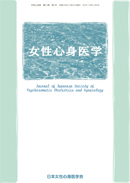Volume 26, Issue 3
Displaying 1-23 of 23 articles from this issue
- |<
- <
- 1
- >
- >|
-
2022Volume 26Issue 3 Pages 243-244
Published: 2022
Released on J-STAGE: March 31, 2022
Download PDF (128K)
-
2022Volume 26Issue 3 Pages 263-264
Published: 2022
Released on J-STAGE: March 31, 2022
Download PDF (147K)
-
2022Volume 26Issue 3 Pages 265-272
Published: 2022
Released on J-STAGE: March 31, 2022
Download PDF (352K) -
2022Volume 26Issue 3 Pages 273-274
Published: 2022
Released on J-STAGE: March 31, 2022
Download PDF (131K) -
2022Volume 26Issue 3 Pages 275-280
Published: 2022
Released on J-STAGE: March 31, 2022
Download PDF (1038K) -
2022Volume 26Issue 3 Pages 281-282
Published: 2022
Released on J-STAGE: March 31, 2022
Download PDF (129K) -
2022Volume 26Issue 3 Pages 283-284
Published: 2022
Released on J-STAGE: March 31, 2022
Download PDF (121K) -
2022Volume 26Issue 3 Pages 285-288
Published: 2022
Released on J-STAGE: March 31, 2022
Download PDF (339K) -
2022Volume 26Issue 3 Pages 289-293
Published: 2022
Released on J-STAGE: March 31, 2022
Download PDF (351K) -
2022Volume 26Issue 3 Pages 294-298
Published: 2022
Released on J-STAGE: March 31, 2022
Download PDF (416K) -
2022Volume 26Issue 3 Pages 299-301
Published: 2022
Released on J-STAGE: March 31, 2022
Download PDF (222K) -
2022Volume 26Issue 3 Pages 302
Published: 2022
Released on J-STAGE: March 31, 2022
Download PDF (123K) -
2022Volume 26Issue 3 Pages 303-308
Published: 2022
Released on J-STAGE: March 31, 2022
Download PDF (599K)
-
2022Volume 26Issue 3 Pages 309-313
Published: 2022
Released on J-STAGE: March 31, 2022
Download PDF (619K) -
2022Volume 26Issue 3 Pages 314-317
Published: 2022
Released on J-STAGE: March 31, 2022
Download PDF (234K) -
2022Volume 26Issue 3 Pages 318-321
Published: 2022
Released on J-STAGE: March 31, 2022
Download PDF (247K) -
2022Volume 26Issue 3 Pages 322-327
Published: 2022
Released on J-STAGE: March 31, 2022
Download PDF (1027K) -
2022Volume 26Issue 3 Pages 328-332
Published: 2022
Released on J-STAGE: March 31, 2022
Download PDF (370K) -
2022Volume 26Issue 3 Pages 333-337
Published: 2022
Released on J-STAGE: March 31, 2022
Download PDF (338K)
-
2022Volume 26Issue 3 Pages 338-347
Published: 2022
Released on J-STAGE: March 31, 2022
Download PDF (372K) -
2022Volume 26Issue 3 Pages 348-355
Published: 2022
Released on J-STAGE: March 31, 2022
Download PDF (571K) -
2022Volume 26Issue 3 Pages 356-362
Published: 2022
Released on J-STAGE: March 31, 2022
Download PDF (422K)
-
2022Volume 26Issue 3 Pages 363-368
Published: 2022
Released on J-STAGE: March 31, 2022
Download PDF (582K)
- |<
- <
- 1
- >
- >|
